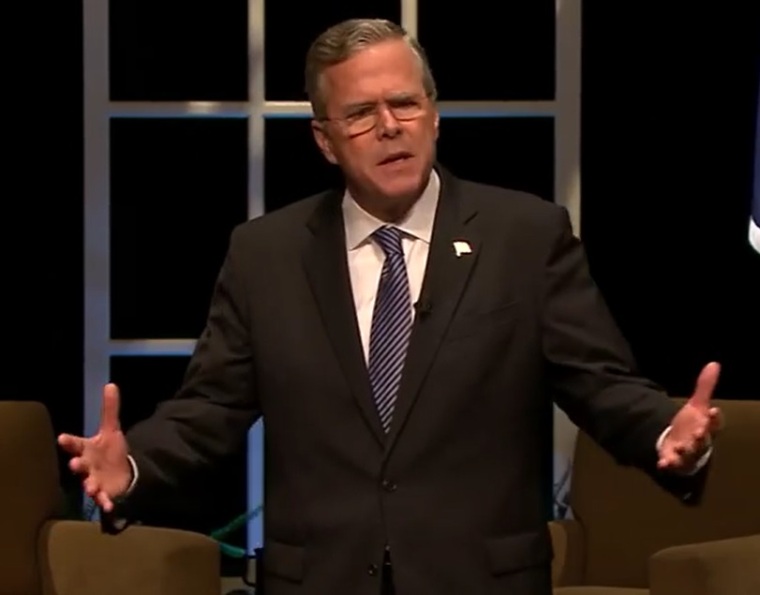Jeb Bush shares faith journey, religiously influenced priorities at Regent University

VIRGINIA BEACH, Va. (Christian Examiner)—On Friday, Republican presidential candidate Jeb Bush told an audience gathered at Regent University in Virginia Beach, Va., how his religious faith informs his political philosophy, specifically citing his views about life, subsidiarity and religious freedom. Bush shared the views during a presidential forum before sitting down for an interview with former Republican presidential candidate and Regent University chancellor Pat Robertson.
"Now, there's a debate over whether people of faith should actually act on their faith in the public square," said Bush at a Regent University Presidential Candidate Forum.
"Really? How do you put aside your faith on the important issues that truly matter, the questions of life, the questions of compassion, the things that motivate people to act on their heart to try to help people? I, for one, believe that people of faith should act on their faith," Bush said.
Bush's comments to the Regent University crowd came during a week when the former two-term Florida governor cut expenses and staff before a third Republican presidential debate on this coming Wednesday. Bush has been in single digits in most of the major polls, typically behind Ben Carson, Donald Trump and fellow Floridian Senator Marco Rubio.
Bush started the presidential forum off by explaining his faith journey. Born into an Episcopalian family, he told the audience he attended Sunday School each week as a boy. He noted that his faith got more serious when he married his Roman Catholic wife, Columba, in 1974.
"I was kind of overwhelmed with work," said Bush, as he recounted his conversion experience. "It wasn't like there was any kind of traumatic experience going on in my life, but I was living in the tyranny of the present, maybe people understand this, people driven to success. I was kind of overwhelmed. At one point I just said, 'I've got to pause. I've got to get quiet.' And I started reading the Bible. I think it was like Romans, got about to there and I realized that Jesus was my Savior.
"I accepted him in the late 1980s, and it has given me a comfort that I can't explain to you really well. But I can promise you it has given me a comfort and a serenity that has made my life journey a lot easier and a lot simpler."
During the speech, Bush focused on three specific ways his faith connects with public policy decisions. First, he said his faith has impacted his decision to protect life. He pointed to a variety of his actions as governor that affirmed life, such as increasing the number of adoptions, eliminating partial-birth abortions and initiatives to help low-income residents get a better education.
"Life is precious, and it is something that should be protected," Bush said. "As governor, I got to do just that. I did it with my arms wide open. I didn't do it in any kind of secret plan. I didn't do it judging people."
Bush then turned his attention to what he called the power of subsidiarity, a Roman Catholic social teaching that asserts decisions should be made as close as possible to the local level. At that point, the former governor discussed his desire to see less political decisions made by the federal government and more reserved for state and local officials.
"We need to challenge and disrupt the order in Washington D.C. if we're serious about protecting people that are deserving of receiving government support," Bush said. "Most people just want government to get out of the way, and they're right. But there are people who truly need the help of government, and we need to be effective on how we're doing it. That comes from my faith, and I hope it comes from yours as well."
Finally, Bush referenced what he called "America's first freedom," religious liberty. He pointed to his desire to help Christians in the Middle East who are being killed by radical Muslims and deal with infringements to religious liberty in the United States as well.
"I've met people along the journey who are losing loved ones because of their faith," said Bush, speaking specifically about persecuted Christians in the Middle East. "In fact, Mosul, for 1,400, 1,500 years, communion was given in Mosul. Today, it's not because of this radical Islamic threat that exists in a caliphate the size of Indiana. Now religious people are being persecuted and murdered and beheaded. This is a place where the United States needs to stand tall. But for us, who?"
Bush followed up his speech with a wide-ranging conversation with Robertson. The two talked about foreign policy, the tax code, Social Security, Medicare, Islamic extremism and urban issues, among other topics.